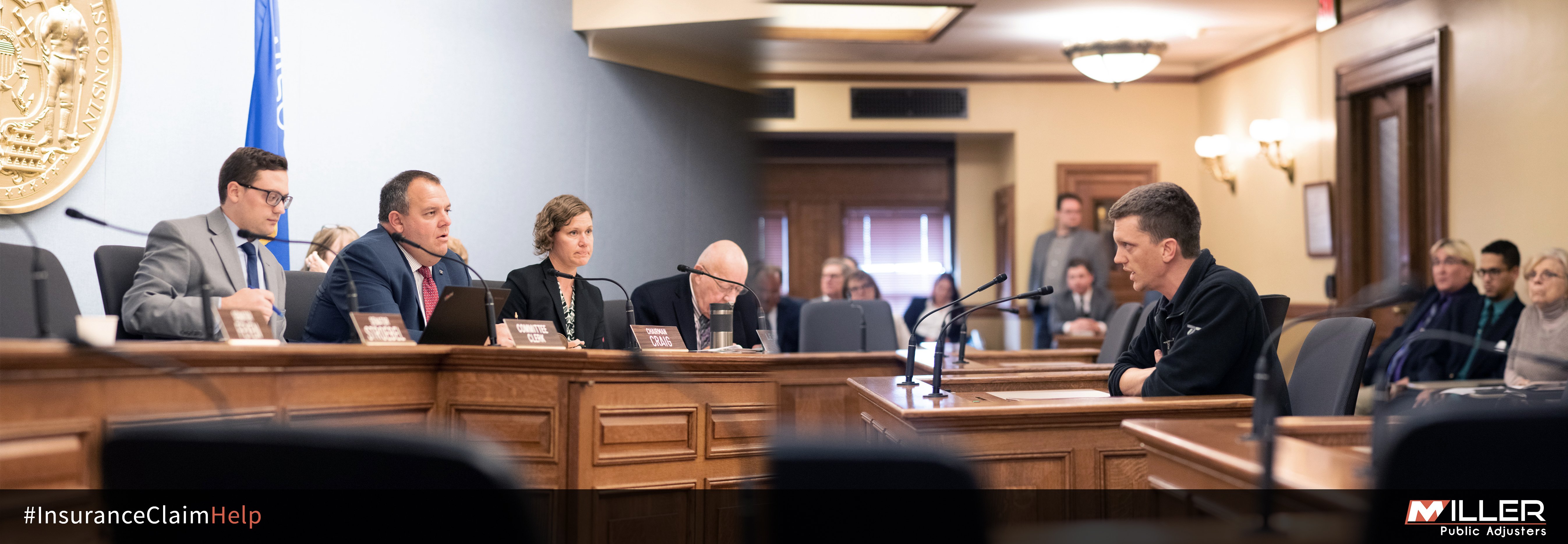
Following a severe storm, fire, or other disaster, Wisconsin property owners are exposed to an influx of people from out of state selling services on behalf of roofers, building contractors, public adjusters, and insurance-related businesses. Concealed among the many skilled actors coming to assist our friends and neighbors are a few bad actors intent on taking advantage of people facing complicated property insurance claims.
Limiting the opportunity for these bad actors to take advantage of Wisconsin residents who suffer property damage was the subject of a seven-month effort by the Wisconsin State Legislature. The result was the passing of Act 129, signed by Gov. Evers on March 3, 2020. This new law relates to the registration and regulation of public adjusters who represent the interests of policyholders who suffer covered losses such as fire, water, wind, or hail damage. However, the new law is limited in scope, as it fails to include all adjusters operating in the state.
Requirements of Act 129
All out-of-state public adjusters who want to conduct public adjusting services on behalf of Wisconsin policyholders must apply for registration with the Office of the Commissioner of Insurance (OCI). Registration is required every two years, along with the following:
- Registration Fee
- Examination to test the applicant’s knowledge about the duties and responsibilities of a public adjuster, insurance laws and regulations of this state. A reciprocal provision allows out-of-state public adjusters the opportunity to submit proof of home-state licensure in lieu of passing the registration examination, all subject to OCI
- Fifteen credits of continuing education
- Re-format and submit service contracts to OCI
Registration is optional for Wisconsin-based public adjusters; however, both non-resident and resident public adjusters will be subject to:
- Bonding and disclosure requirements
- Legal prohibitions
- A 10 percent fee cap in the event either the president of the United States or Wisconsin governor declares a state of emergency
Does Act 129 go far enough to truly protect the Wisconsin consumer?
My firm, Miller Public Adjusters, supports and has been an advocate of licensing, not just for public adjusters, but for everyone involved in adjusting property insurance claims. Act 129 addresses the qualifications of only a fraction of the insurance adjusters operating here: out-of-state public adjusters. The new law completely ignores qualifying the many staff and independent adjusters whose mishandling of claims makes public adjusting necessary in the first place. It also overlooks the consultants hired by insurance companies to adjust losses or influence coverage decisions when, in fact, they are not licensed to do so.
Who is behind Act 129?
Act 129 was an industry-written bill introduced at the request of the Wisconsin Insurance Alliance (WIA) and the National Association of Public Insurance Adjusters (NAPIA).
Miller Public Adjusters, the ONLY member of NAPIA in Wisconsin, was never made aware of this legislation, and zero input was provided by any other Wisconsin public adjuster. The original bill was sold to be based on the model public adjuster licensing act developed by the National Association of Insurance Commissioners (NAIC). WIA publicly stated that bad acting public adjusters were the sole reason legislation was needed, and provided a series of wild allegations about public adjusters leaving consumers with un-finished repairs, and intercepting and absconding with homeowners’ insurance claim payments. These fear tactics were a constant in the push, designed to secure votes from the legislators who don’t understand the critical role public adjusters serve in representing policyholders faced with property insurance claims.
In reality, Assembly Bill 357 and Senate Bill 329 had nothing to do with protecting Wisconsin property owners. This was the insurance industry attempting to bring forth legislation in yet another of their ongoing efforts to keep policyholder advocates out of the claims process.
As the bill moved forward, WIA doubled down on their fear mongering, the model act language was all but set aside, and NAPIA ultimately surrendered their voice in the process. Thankfully, after testifying before the Assembly and Senate committees, a few Senators began the process of truly picking the legislation apart to understand why it was needed and if it would be effective. However, because the bill was so poorly written in the first place, and slanted toward protecting the Insurance industry, the end legislation is far from what is needed to protect Wisconsin property owners.
What’s next?
Act 129 is currently undergoing the rules-writing process, and it will take effect in late summer. My goal, with support from the American Adjuster Association (AAA), is to draft sensible legislation that requires anyone who provides claim services to Wisconsin policyholders be properly licensed. This includes proper training of all who make decisions regarding claim payment, coverage, and damage assessments.
We need you and your voice
You can help. The AAA National Advisory Board is calling on everyone who works with policyholders — contractors, engineers, architects, public adjusters, attorneys, etc. — to unite in moving policyholders’ interests to the front of the line. Contact AAA today to ensure the delivery of comprehensive legislation that provides Wisconsin property owners the fair treatment and protection they deserve when filing a commercial or homeowners insurance claim.
If you have thoughts or questions about how this bill affects you or your clients, feel free to reach out to us to talk through this bill. You can contact us through the website, social media, or email us your questions and we will work to get back to you promptly. Our goal is to be the advocate for policyholders and help the industry stay on top of changing laws and regulations.
.png?width=190&height=55&name=MPA%20Logo%20Vector%20-%20Original%20(3).png)

.webp?width=331&height=382&name=ResourcesCTA-Fin-001%20(1).webp)



